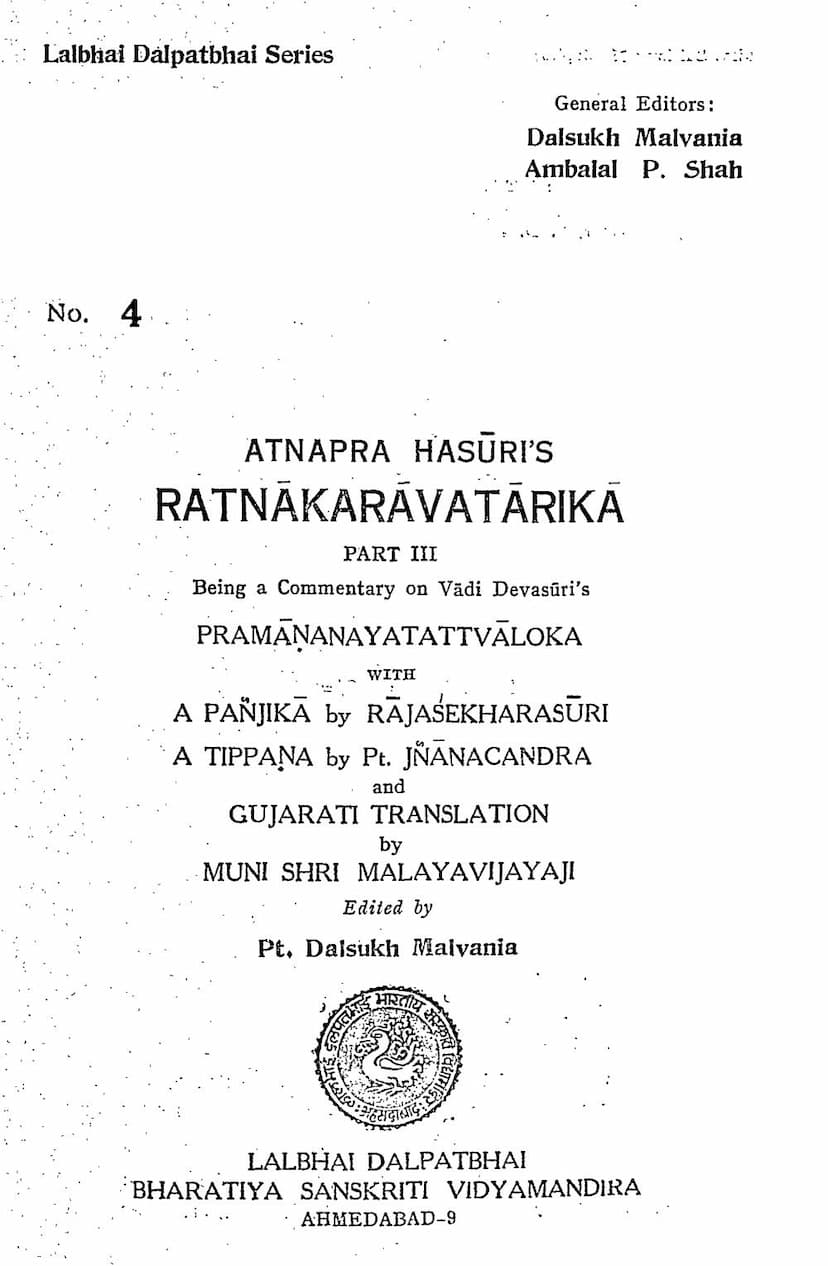Ratnakaravatarika Part 03
Added to library: September 2, 2025

Summary
This volume, Ratnakaravatarika Part 03, published by L. D. Indology Ahmedabad as part of the Lalbhai Dalpatbhai Series (No. 4), presents the third and final part of a commentary on Vadi Devasuri's Pramanavarnatattvaloka.
The work is a significant contribution to Jain logic and epistemology. It includes:
- A Panjika by Rajasekharasuri: This provides a detailed commentary on the original text.
- A Tippana by Pt. Jnanacandra: This offers further notes and explanations.
- Gujarati Translation by Muni Shri Malayavijayaji: This makes the philosophical concepts accessible to a Gujarati-speaking audience.
- Edited by Pt. Dalsukh Malvania: The editor's introduction, written in Gujarati, delves into Jain logic and provides biographical accounts of the key authors: Acarya Vadidevasuri, Acarya Ratnaprabha, Acarya Rajasekhara, and Muni Jnanacandra.
The preface expresses gratitude to those involved in the publication, including Pt. Bechardasji Dosbi for printing, Pt. Ambalal P. Shah for proofreading, and Pt. Rupendrakumar for index preparation. Muni Malayavijayaji is specifically thanked for the Gujarati translation. The editors hope this work will significantly enhance the understanding of Jain logic and Indian logic in general.
The text itself is structured into several paricchedas (chapters) as indicated by the table of contents (विषय सूची):
- Naya-Atmasvaroopanirnayo Nama Saptamah Paricchadaḥ (Chapter 7): This chapter focuses on the concept of Naya (standpoint) and the nature of the self (Atman) from a Jain perspective, including discussions on different schools of thought and refutations of opposing views.
- Vad Svaroopanirnayo Nama Astamah Paricchadaḥ (Chapter 8): This chapter deals with the concept of Vada (debate/discussion) in Indian philosophy, outlining its rules, participants, and the structure of argumentation.
The Pramanavarnatattvaloka itself is a foundational text on Jain logic, and this commentary provides a comprehensive analysis of its key concepts, including:
- Pramana (Means of Valid Knowledge): Discussions on the nature of Pramana, its classification into Pratyaksa (direct perception) and Paroksa (indirect knowledge), and the Jain understanding of valid cognition.
- Naya (Standpoint): The text explores the Naya system, a crucial aspect of Jain philosophy that explains how reality can be understood from multiple, seemingly contradictory, viewpoints. It elaborates on various Nayas and their classification.
- Logic and Debate: The work also touches upon the principles of argumentation and debate (Vada), highlighting the dialectical method employed in Indian philosophical discourse.
- Refutation of Other Philosophies: The commentary engages with and refutes the logical and epistemological positions of other Indian philosophical schools, such as Buddhism, Nyaya, and Sankhya, presenting the Jain perspective on these matters.
- The Nature of Reality and the Self: The text delves into the Jain ontology, discussing the nature of reality, the self (Atman), karma, and liberation (Moksha), all viewed through the lens of Jain logic.
The detailed table of contents and the extensive shuddhipatraka (errata) at the end indicate the scholarly nature and meticulousness of this publication. The Ratnakaravatarika Part III is thus a vital resource for scholars and students of Jainism, logic, and Indian philosophy.